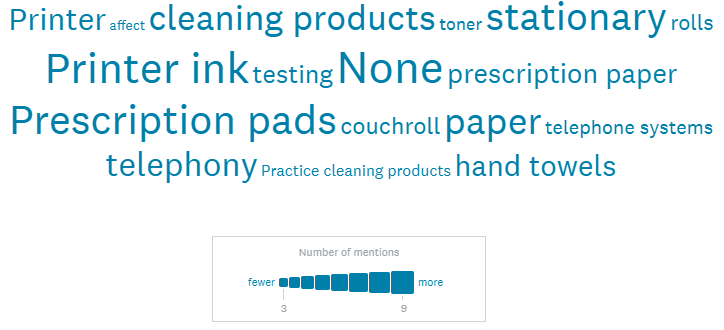EU Exit Planning: Non-Clinical Goods and Services
![]() Thank you for responding to our recent survey on practice needs in the event of a no-deal Brexit. We rely on your input.
Thank you for responding to our recent survey on practice needs in the event of a no-deal Brexit. We rely on your input.
Following a discussion at our Annual General Meeting on Thursday 24 January, we asked you about the impact of a no-deal EU exit on your practice-critical Non-Clinical Goods and Services (NCGS). Medical devices, clinical consumables and medicines are being considered separately.
We asked you to consider:
- The dependency of those goods/ services on that front-line service;
- The criticality of that front-line service and its clinical importance; and
- Outsourced services such as equipment maintenance.
We had a really good response and have been able to advise officials about supply concerns across London in good time. Whilst there were a number of respondents who are unconcerned about the impact of no-deal Brexit, those who do harbour concerns highlighted a number of non clinical products and services which they fear might be affected. These include:
- Stationary;
- Printer ink;
- Prescription pads;
- Couch roll;
- Paper;
- Telephony;
- Cleaning products;
- Prescription paper;
- Printer;
- Hand towels;
- Testing;
- Telephone systems;
- Practice cleaning products; and
- Toner.
We will continue to work with officials to identify and anticipate the impact of Brexit on London general practice, be it no-deal or otherwise. Other possible EU exit risks include:
- Goods or services that have supply chain touch points in the EU;
- Personal data held in EU member countries;
- Supply routes into the UK via Dover/ Calais; and
- Dependencies on EU regulations.
If you have any comments or questions about this work, please contact us.
This word cloud gives some indication of respondents' concerns.

Londonwide LMCs conference 2019 round-up (19 Mar 2019)
On 12 March 2019 we hosted our annual conference – titled “All Together Now” - at the Kia Oval. The day was a great success with an array of guest...New ICO advice on handling Subject Access Requests (19 Mar 2019)
The Information Commissioner’s Office (ICO) have recently released a blog containing further advice for GPs and practices on the right of access for patients, commonly called Subject Access Requests (SARs)....Londonwide LMCs’ board changes (15 Mar 2019)
Following elections we would like to welcome Dr Anouska Hari (NW) and Dr Naureen Bhatti (NC/NE) to the board. Dr Marek Jarzembowski (South), Dr Robbie Bunt (NC/NE), Dr Simon Parton...New BMA locum template terms and conditions (13 Mar 2019)
The BMA GPC and sessional subcommittee have jointly produced model terms of engagement for locum GPs, which they recommend both practices and locums should proactively adopt. It should be noted that...Safeguarding Children and Adults L2 - Wednesday 22 May 2019 - places still available (27 Feb 2019)
...Londonwide LMCs' February 2019 Newsletter (20 Feb 2019)
...Tips of the month February 2019 (19 Feb 2019)
We provide weekly tips based on common queries which come through to us from London GPs and practice teams. These are shared via social media and collated for...QOF business rules coding issues – update for practice teams (19 Feb 2019)
Please note that no action is currently needed by practices on this matter, but you should read the information carefully. Following the introduction of the SNOMED-CT coding in 2018/19, NHS...Type 2 opt-outs replaced by the national data opt-out (19 Feb 2019)
Type 2 opt-outs have been replaced by the national data opt-out so practices must no longer use the type 2 opt-out code to record a patient's opt-out choice as it...The Data Security and Protection Toolkit (DSPT) – further guidance now available (19 Feb 2019)
The The Data Security and Protection Toolkit (DSPT) replaced the Information Governance toolkit from April 2018. The DSPT is an online self-assessment toolkit that has to be used by all...Guidance
We provide expert guidance for practices in our guidance section, as well as an archive of other materials you may find useful.
GP Support
Contact our GP Support team if you need help or advice.
The team provide professional and pastoral support to GPs and practice teams on a broad range of issues.

